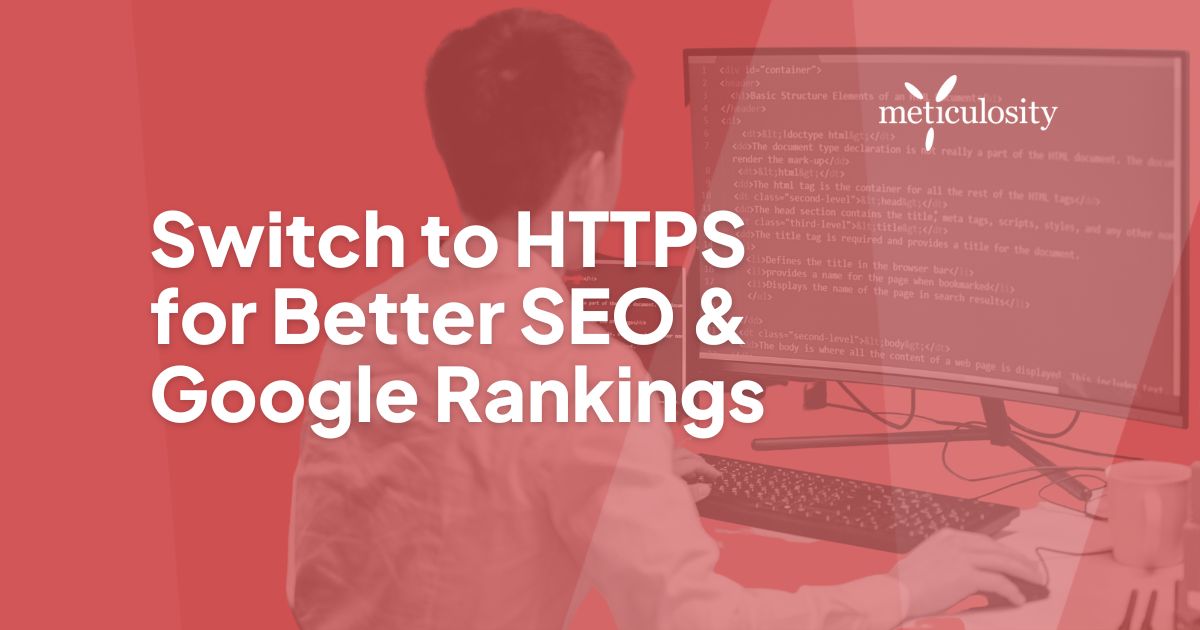In the past, websites primarily relied on the standard HTTP (Hypertext Transfer Protocol) for transmitting data between the web server and the user's browser. However, as the internet landscape evolved, so did the need for heightened security measures.
This led to the emergence of HTTPS (Hypertext Transfer Protocol Security), an encrypted server protocol that creates a secure website connection, ensuring the protection of sensitive data like passwords and credit card information. While HTTPS was initially reserved for securing only critical data, it has now become a vital component of web security and SEO best practices.
What is HTTPS?
HTTPS is an encrypted server protocol that creates a secure website connection from the web server to the web browser. The security mechanism is established by adding an SSL certificate to your web host and, once installed, will show a green padlock icon in your browser's address bar.
Is HTTPS Good for SEO?
When Google announced that it would favor websites using HTTPS encryption with a boost in search results, many began to reevaluate their sites' security policy. So, recent polls have shown that 24 percent of site owners plan to switch to HTTPS for enhanced website security and SEO benefits.
HTTPS Benefits for SEO
Once upon a time, adding HTTP Secure to your website required risk, cost, and technical know-how. However, today, it's as easy as making a quick selection in your web hosting control panel.
Today, there's no reason not to have the benefits - more security, improved referral data, and an HTTPS Google rankings boost – can make it worth the effort.
Check out our Inbound Website Assessment Tool
1. SEO Benefits of Switching to HTTPS
Besides increased security, switching to a secure HTTP encryption offers SEO benefits. These include:
- Increase search rankings
- Preserves referrer data
- More secure & private
Increase Search Rankings
The obvious one: As stated, Google has confirmed the slight ranking boost of HTTPS sites. Like most ranking signals, it is very hard to isolate on its own, but this is still something to keep in mind. On the plus side, the value of switching to HTTPS is very likely to increase over time.
Preserves Referrer Data
Typically, traffic that passes through an HTTP Secure site to a non-encrypted HTTP website is stripped of its referral data. An HTTP Secure analytics report will show the data as “Direct.” The problem is that you won’t know where the traffic originated.
When traffic passes to an HTTP Secure site, it retains referral data. As more websites switch to the secure protocol, this becomes quite important for marketers.
More Secure & Private
HTTPS adds an extra layer of security which helps your website and SEO goals in many ways:
- It verifies the website's identity.
- It prevents third-party tampering.
- It secures your site for visitors.
- It encrypts all site data, including URLs, browsing history, and credit card numbers.
2. Google HTTPS SEO
Google has offered boosted HTTPS search engine rankings for those making the switch to encryption. While the company has confirmed the ranking boost, recent studies have shown that HTTP Secure may not provide any significant advantages in terms of site rankings.
/Imported_Blog_Media/https-not-secure-750x179-Jun-28-2021-11-07-20-50-PM.png?width=750&height=179&name=https-not-secure-750x179-Jun-28-2021-11-07-20-50-PM.png)
It’s important not to rely on HTTP Secure as your sole method for increasing your site’s ranking. If you're concerned about your search HTTPS placement, here are a few things you can do to make a larger impact:
- Run competitive analysis
- Improve your SEO meta tags
- Eliminate crawl errors
- Correct duplicate content
- Audit the website
- Create engaging content
- Optimize the site for speed
More Security & Privacy
Some analysts have argued that HTTP Secure is only effective if your website uses sensitive passwords. This isn’t exactly true – even simple content websites can benefit from HTTP over SSL encryption. HTTP over SSL encryption secures your website in several ways:
- The encryption verifies that the website is the one the server should be “talking” to
- It prevents tampering from third parties, stopping “man-in-the-middle” attacks
- It secures all communication, protecting browsing history and credit card information
3. The Challenges of Switching to HTTPS
Switching your website to HTTP over SSL encryption can be complicated. Here are some things to consider throughout the process.
Website Errors
You may run into a few issues when switching to HTTP Secure. Some of them include:
- Blocking important URLs in robots.txt
- Pointing canonical tags at the wrong HTTP URL
- Your website is displaying browser bars that frighten people, like security warnings

Some webmasters have seen their HTTPS search engine rankings and conversions drop after installing HTTP Secure. Most of the time, these technical issues are easily fixed, but it’s important to be prepared for the worst.
Slower Speeds
HTTP Secure requires more communication between servers, which might slow down your website. Speed can affect your search HTTPS ranking, especially with mobile. Fortunately, you can prevent speed issues by following best practices when implementing HTTP over SSL encryption.
Higher Costs
SSL certificates can cost approximately $100-$200 a year, a significant cost for small websites. However, switching to HTTP Secure can be free, saving you money on website maintenance.
With benefits like boosted search rankings and more reliable security, switching to a secure HTTP encryption is well worth the investment.
Growing Pains
Some websites may not be advanced enough for HTTP Secure. Older web apps can have difficulty processing HTTP Secure URLs. In addition, websites that run AdSense may experience a drop in earnings. Google restricts these ads to those that comply with SSL.
/Imported_Blog_Media/https-security-seo-750x463-Jun-28-2021-11-07-21-16-PM.jpg?width=750&height=463&name=https-security-seo-750x463-Jun-28-2021-11-07-21-16-PM.jpg)
4. The Number of Sites Using HTTPS
While many websites use HTTP over SSL encryption, most of them limit their usage to checkout and registration pages. In fact, only 4.2 percent of the top 10,000 sites redirect visitors to HTTP Secure by default. This percentage drops to 1.9 percent for the top million websites.
5. HTTPS & SEO Best Practices
What are the SEO implications of switching to an HTTP over SSL encryption? We’ll explore the topic in this section.
What Type of SSL Certificate is Best?
There are thousands of SSL certificate options to sift through, which can lead to confusion. The two major types of SSL certificates include:
- Standard Validation SSL: These certificates provide a basic level of validation. The cost usually runs between $0-$100.
- Extended Validation SSL: These certificates offer a higher level of validation, but they typically are more expensive than the standard type, costing between $100-$500.
In terms of HTTPS Google rankings, the certificate you choose makes no difference. From the user’s perspective, the certificate type can have an impact. The green bar that signifies extended security often fosters trust among website visitors.
6. Preserving Your Search Engine Rankings
These tips will help you receive the best SEO results from your HTTP Secure encryption.
- Ensure each element of your site uses HTTP Secure.
- Use 301 redirects to point all HTTP URLs to HTTP Secure.
- Make sure all canonical tags point to the HTTP Secure version of your URL.
- When possible, use relative URLs.
- Make sure all hard-coded internal links point to HTTP Secure.
- Register the HTTP Secure version of your website in Google Search Console and Bing.
- Update all sitemaps to reflect the new URLs and submit them to Google Search Console.
- Be sure that your robots.txt file is updated so it won’t block any important web pages.
- Update your analytics tracking code if necessary.
- Implement HSTS or HTTP Strict Transport Security. This allows users only to access HTTP Secure pages even when directed to HTTP pages.



/Imported_Blog_Media/flip-social-Jun-28-2021-11-07-21-86-PM.jpg?width=600&height=403&name=flip-social-Jun-28-2021-11-07-21-86-PM.jpg)





